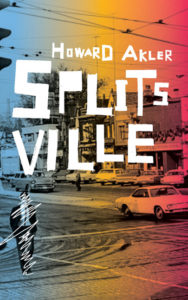October 15, 2018
Splitsville, by Howard Akler
 Howard Akler packs a lot into a scant 119 pages in Splitsville—a neighbourhood, a city, a legendary municipal battle that’s nearly fifty-year-old. History and geography. The beginning, middle and end of a love affair. Words I didn’t know the meanings of, and which made me pull out my underlining pen instead of rolling my eyes in frustration: aniline; exophthalmic; badinage; ulna; oppugnant.
Howard Akler packs a lot into a scant 119 pages in Splitsville—a neighbourhood, a city, a legendary municipal battle that’s nearly fifty-year-old. History and geography. The beginning, middle and end of a love affair. Words I didn’t know the meanings of, and which made me pull out my underlining pen instead of rolling my eyes in frustration: aniline; exophthalmic; badinage; ulna; oppugnant.
And a mystery: Hal Sachs had run a used bookstore on Spadina Avenue as the debate over the Spadina Expressway was heating up, and he falls in love with Lily Klein, fired from her job teaching civics at Harbord Collegiate for activism. (“The point is: people are really steamed. They’re organizing. That’s the true meaning of democracy. It’s not as simple as majority rules. It’s more about voice, about speaking up and about the city learning to listen to other points of view.”)
On the day before the final decision about the Spadina Expressway is brought down, Hal Sachs disappears. Decades later, his nephew (“Aitch Akler:” this is autofiction of a sort, as I understand it, except it’s not exceptionally annoying, distinguishing this novel in the genre) is expecting his first child, and trying to piece together fact and fiction to understand what happened to his uncle, and what happened to the city whose streets and sidewalks he navigates on a peripatetic journey into the past and into the future at once.
A huge part of my passion for this novel is personal: the characters trace the same sidewalks I walk every day, sidewalks that wouldn’t even exist in the Spadina Expressway plan had not been thwarted—because otherwise my neighbourhood would have been demolished. Every day I walk up Robert Street north of Sussex, a playing field because the houses had been bought up and torn down to make way for the expressway that never arrived. On Saturday, we went out for lunch in Chinatown because Splitsville had made me hungry. I know these streets. But it’s more than that too, this novel fulfils a yearning I’ve had for real and deep conversations about civic engagement at a moment when our democratic rights as Torontonians have just been trounced upon a by spiteful and reckless provincial government. What does it mean to fight for something? Does it matter if you win or lose?
I think you need not be a person who cross Spadina Avenue at least six times daily or be someone whose voting rights have recently been undermined to appreciate Splitsville, however. My passion is only partly personal, and is also about the novel’s attention to language, its literary references, its bookstore setting, the subtlety of its plot and pacing, its absolutely perfect conclusion, and the mystery at its core, questions without answers. I was on Page 93 of the book when I went online and ordered another copy to mail to a friend, which is some kind of endorsement for sure. And now that I’ve read to the end, I want to give a copy to everyone.





